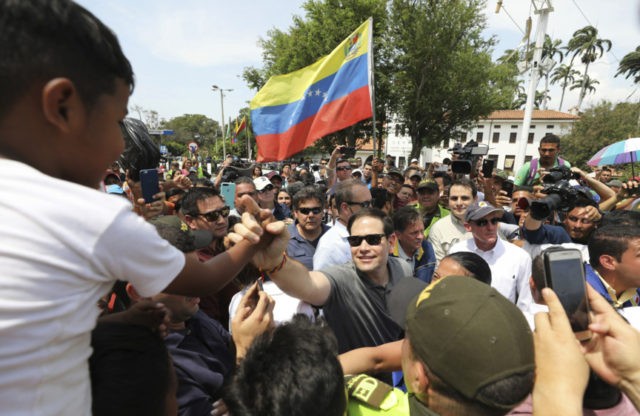Sen. Marco Rubio (R-FL) visited the Colombian border town of Cucutá on Sunday, where he blasted the inhumanity of socialist dictator Nicolás Maduro and pledged to force through the arrival of humanitarian aid from the United States.
Accompanying Rubio were Rep. Mario Díaz-Balart (R-FL) and U.S. Ambassador to the Organization of American States (OAS) Carlos Trujillo.
Over recent weeks, the U.S. has deployed tens of millions of dollars worth in food and medical aid to help alleviate the humanitarian crisis taking place in Venezuela, caused as a result of the policies implemented under Maduro and his predecessor Hugo Chávez. The Maduro regime ordered the military to block the entry of all humanitarian assistance, placing tankers on the international bridge connecting the two countries to prevent its entry.
Rubio arrived on Sunday to meet with U.S. officials and members of Venezuela’s National Assembly, the country’s last democratically elected lawmaking body. In one tweet, he called the Maduro regime’s decision an act of “pure evil.”
“The aid is going to get through. I think ultimately the question is whether it gets through in a way that he’s cooperative with or in a way that he’s not,” he said in an interview with CNN. “There’s no way you’re going to stand, ultimately, in the way of a people whose children are starving to death, whose families are dying in hospitals because of preventable diseases.”
“American, Colombian and Venezuelan officials stand ready to provide much needed humanitarian assistance to the people of Venezuela,” he said in a separate statement. “The people of Venezuela remain resilient in their continued fight for democracy and freedom, and the United States will continue to stand with them.”
The Florida Senator has long been the leading figure in Washington’s anti-Maduro lobby, and is understood to be a key adviser to the Trump administration on their approach to the crisis. In 2017, reports revealed that senior socialist official and alleged drug kingpin Diosdado Cabello ordered Rubio’s assassination before it was foiled by U.S. authorities. Rubio had previously referred to Cabello as “the Pablo Escobar of Venezuela” for his alleged leadership role in the Cartel de los Soles, an intercontinental cocaine trafficking criminal enterprise believed to be run by members of Venezuela’s socialist military.
Over the past month, the White House has escalated its criticism of the Maduro regime, which technically ceased to be in power after interim President Juan Guaidó took over in late January. As well as providing humanitarian aid with the help of other regional contributors, the U.S. has imposed fresh sanctions on the country’s state-run oil industry, thus limiting Maduro’s access to his already depleted financial resources.
Trump has repeatedly refused to rule out a military solution to the crisis, an idea that Rubio has previously indicated he would support on the grounds of ensuring U.S. national security. Maduro’s regime has for years been linked to anti-American terrorist groups such as the Islamist group Hezbollah and Colombia’s National Liberation Army (ELN).
“I believe that the Armed Forces of the United States are only used in the event of a threat to national security,” he said in an interview last September. “I believe that there is a very strong argument that can be made at this time that Venezuela and the Maduro regime has become a threat to the region and even to the United States.”
Follow Ben Kew on Facebook, Twitter at @ben_kew, or email him at bkew@breitbart.com.

COMMENTS
Please let us know if you're having issues with commenting.